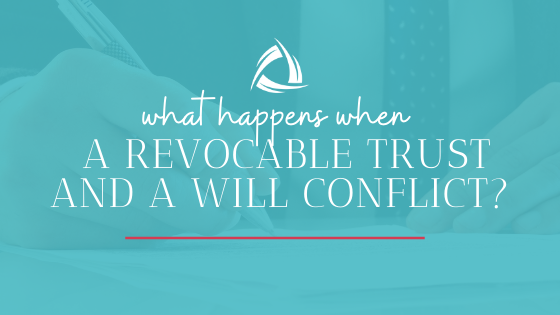It can sometimes be confusing for those dealing with their family estate plans to understand the differences between a living trust and a will, so we wanted to provide a little clarity into what you should know about each, and what happens when these revocable trusts and wills are not in agreement.
To start at the beginning, a trust and a will are separate legal documents, with different powers and possible tax implications, that share the same goal of facilitating a unified estate plan and a frictionless transfer of assets upon the death of a family member. While these estate planning tools usually work together, they have the potential to come into conflict since they are independent legal documents that are formulated considering different factors.
Let’s start with a look at what differentiates the two.
What is a will?
A will is a legal document that details a person’s wishes for how they would like their assets and possessions (as well as any minors they are responsible for) distributed. It can contain a number of different directions, but it generally includes at least the following information:
- An executor, who is responsible for ensuring that all instructions are carried out per the decedent’s wishes.
- A list of beneficiaries, who are the people that will inherit the decedent’s property.
- A breakdown of the exact distributions desired. This can be as straightforward as having all of the possessions left to a spouse and children, or as complex as dividing the money and assets of different types to different relatives, non-profits, and un-related persons.
- Designate guardians for children if they are minors. This can also be part of a joint will between two spouses.
Having a will usually makes the probate process easier for the family upon death, but it will not prevent them from going through the probate process.
What is a revocable trust?
A revocable trust is a legal entity that manages and protects the assets of the grantor as that person ages. The trust is managed by a trustee who is also in charge of distributing the assets to the beneficiaries upon death and remains private even through the grantor’s passing away, at which time it becomes irrevocable.
A revocable trust is a trust whereby provisions can be changed, withdrawn, or canceled based upon the desires of the living grantor. The revocable trust is unique in that it allows for a wide amount of flexibility, as well as enabling the grantor to still receive income from the assets placed within the trust. As long as one beneficiary is named, a revocable trust is able to avoid probate court, guardianship, or conservatorship proceedings.
Who wins?
If there is a conflict in instructions, the directives held within the revocable trust will supersede those of the will. By definition, a revocable trust is a living trust, which means that it was established while the grantor is still alive. Since revocable trusts become operative before the will takes effect (at death), the trust takes precedence over the will if there are discrepancies between the two. Additionally, a will does not have the ability to decide who receives any assets in a living trust. This includes real estate properties, cash, vehicles, equities, bonds, art pieces, or items of value.
To elaborate…
A trust is its own legal entity independent from the individual who places the assets in it. Therefore, upon the death of the person establishing the revocable trust, the assets included in the trust never enter into the probate process with the individual’s other assets.
Usually, when a person passes away, their will goes into effect during a process called probate. Probate is a legal proceeding that looks to distribute the property of the recently deceased person, in accordance with the terms dictated by their will. Throughout this court-supervised process, the deceased person’s will is authenticated, their individual assets are assessed and then distributed to that person’s named beneficiaries. However, probate does not apply to assets held in a living trust, because those assets are not legally owned by the deceased person.
Also important to know…
Although a revocable trust supersedes a will, the trust only controls what has been put inside of it. That means that if a revocable trust has been created, but the assets in question have not been moved into it, the trust has no power over those assets at the time of the grantor’s death. Any assets that are still outside of the trust at the time of death are outside the trust’s purvey.
If you have questions about your family’s succession planning, reach out to the team at Hartmann Law & Mediation on our website at https://hlawkc.com/ or by calling us at (816) 599-6638.

